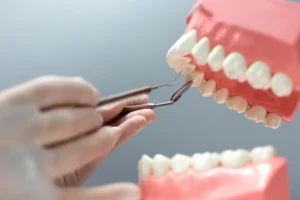
Teeth rarely hurt without a reason. They whisper before they scream — a little sensitivity here, a dull ache there, a spot that doesn’t feel quite right. Most people learn to ignore those signs until they can’t anymore. But every twinge, every strange taste, every gum bleed is the mouth’s way of saying something important: “Please pay attention.”
The good news? Most dental problems don’t appear overnight. They build slowly, giving you time to act — if you’re willing to listen.
The First Warning: Sensitivity
It usually starts small — a cold drink that hits too sharply or a spoon of ice cream that suddenly stings. Tooth sensitivity feels minor at first, but it’s rarely random. It often means enamel is thinning or gums are pulling back, exposing sensitive areas that were never meant to be touched by air or temperature.
Enamel doesn’t heal itself. Once it’s worn down, it can only be protected, not replaced. That’s why sensitivity is a sign, not a phase. It tells you that your teeth are losing their natural armor — sometimes from brushing too hard, sometimes from acid in food, sometimes from simple neglect.
Ignoring it doesn’t make it go away. It just makes the next stage worse.
The Silent Problem: Gum Disease
Gums don’t get enough credit. They hold everything together quietly, without complaint — until they can’t anymore. Bleeding while brushing isn’t normal. Swelling, redness, or bad taste in the mouth often means early-stage inflammation.
At first, it’s called gingivitis — reversible, treatable, fixable. But when ignored, it becomes periodontitis, a chronic infection that can eat away at bone and make teeth loose over time.
What’s tricky is that it doesn’t always hurt. You might think your teeth are fine until one day they start shifting, and suddenly you’re not smiling the same way anymore.
Healthy gums are like soil — if they weaken, everything above them eventually falls.
The Unseen Enemy: Cavities
Cavities are sneaky. You don’t feel them forming. They start as soft spots, invisible to the eye and painless at first. By the time you notice, the bacteria have already drilled deep enough to hit nerves.
Sugar isn’t the only culprit — it’s how long sugar stays on your teeth that matters. Sipping sweet drinks or snacking often keeps acid levels high for hours. The mouth never gets a break to neutralize itself.
The best protection is rhythm: brush, rinse, repeat. Not obsessively — just consistently. Cavities love routine neglect; they hate routine care.
The Grinding Habit
Stress doesn’t just live in your head — it lives in your jaw. Many people grind their teeth without realizing it, especially at night. Over time, that pressure flattens edges, cracks enamel, and strains the muscles around your face.
Morning jaw pain, headaches, or even shoulder tension can all trace back to grinding. It’s the body’s way of releasing what the mind can’t.
Mouth guards help, but the real solution is awareness — learning to unclench during the day and manage stress before it reaches your teeth.
The Breath Problem No One Talks About
Bad breath isn’t just embarrassing — it’s information. Persistent odor usually means something’s off in the mouth’s ecosystem. Bacteria thrive where they’re not supposed to — between teeth, under the gums, or on the tongue.
Sometimes it’s dryness, sometimes infection, sometimes a sign of deeper issues like cavities or gum disease. Covering it with mints only hides the message.
A clean tongue, regular hydration, and healthy gums do more for breath than any spray ever could. Freshness comes from balance, not perfume.
The Hidden Connection to the Rest of the Body
Dental problems don’t stay in your mouth. The bacteria that cause gum disease can enter the bloodstream, contributing to inflammation throughout the body. Research connects poor oral health with heart issues, diabetes, and even cognitive decline.
It sounds dramatic, but the mouth really is the gateway to everything else. When it’s inflamed, your whole system feels it. That’s why taking care of your teeth isn’t vanity — it’s medicine.
Why Prevention Is Easier Than Repair
Fixing problems hurts more — physically and financially — than preventing them ever will. A ten-minute cleaning twice a day can save thousands in treatment later. Regular dental visits catch what you can’t see, long before it becomes an emergency.
But prevention isn’t just about brushing. It’s about habits: less sugar, more water, balanced meals, and paying attention when your body whispers.
Most dental pain doesn’t appear suddenly — it’s a delayed echo of something ignored.
Picture Credit: Freepik

